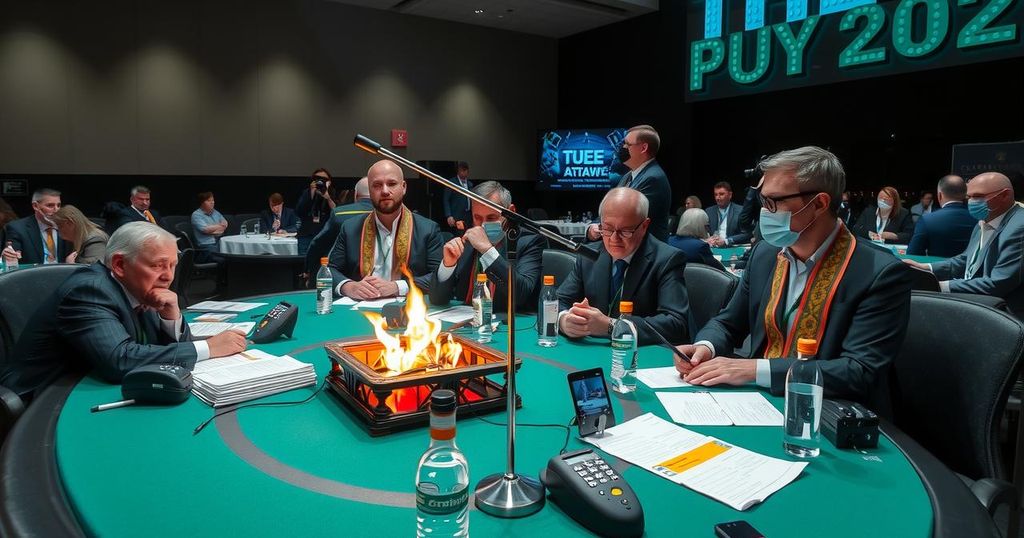COP29 in Azerbaijan unveiled a modest $300 billion annual climate pledge by 2035, significantly under the required $1.3 trillion. However, a new coalition of over 30 countries, linking both developed and developing nations, has committed to more decisive action towards achieving net zero emissions. Their strategy reflects an understanding of the imperative need to curtail greenhouse gas emissions to limit global temperature rise to within 1.5 degrees Celsius, despite troubling trends in climate indicators.
The United Nations’ climate negotiations, particularly showcased at COP29 in Azerbaijan, have historically provided limited advancements, akin to meager sustenance for the global climate agenda. The recent conference resulted in a modest pledge of $300 billion per year by 2035 towards climate initiatives, falling significantly short of the required $1.3 trillion. Yet, amidst this restrained backdrop, a noteworthy coalition emerged, comprising both developing and developed nations, committed to accelerating climate action and establishing stringent targets for net zero emissions.
This coalition includes over 30 nations contributing to approximately one-third of the world’s gross domestic product. Their initiative represents a critical shift in strategy aimed to avert catastrophic climate change and maintain global temperature increases within the internationally sanctioned limit of 1.5 degrees Celsius. This proactive stance is crucial, particularly as current climate indicators show an alarming trajectory, with greenhouse gas emissions rising and unprecedented temperature highs being recorded.
An alarming report by scientists highlights the precariousness of our current situation, noting that we risk initiating several irreversible climate disasters should temperatures rise above 1.5 degrees Celsius. If specific tipping points are reached, such as the loss of the Greenland Ice Sheet, the repercussions could be dire. Despite these challenges, the coalition is motivated by encouraging analyses from the Rhodium Group, which suggest that with robust action, it is feasible to limit temperature increases significantly.
The Rhodium Climate Outlook 2024 predicts that, without substantial intervention, the world may experience a 2.7 degrees Celsius rise by the century’s end, emphasizing the urgency for nations to adhere to their 2030 emission reduction targets. Conversely, should key nations expedite their efforts, the predicted rise could be as little as 1.8 degrees Celsius under optimal conditions. Moreover, if countries yet to commit to net zero emissions adopt such goals by 2070, and concurrently target reductions in methane and other harmful pollutants, a rise of merely 1.4 degrees Celsius could be achievable by 2100.
Amidst this encouraging outlook, high-profile nations such as the United Kingdom, Brazil, and the United Arab Emirates pledged new targets for 2035 that align with preventing excessive warming. Such commitments form the foundation for upcoming negotiations for COP30, which will be vital for global climate strategy. Notably, reductions of methane emissions are pivotal, as a remarkable 45 percent reduction could notably diminish future warming and lower the likelihood of crossing critical ecological thresholds.
Despite some proactive steps by a few nations, methane levels continue to escalate alarmingly. Barbados Prime Minister Mia Mottley emphasized the necessity of a unified global agreement to tackle methane emissions effectively, citing successful historical precedents like the Montreal Protocol. Her call to action underscores both the urgency of the climate crisis and the potential for coordinated global leadership to pave the way toward a sustainable climate future.
The annual climate negotiations held under the auspices of the United Nations often result in limited progress towards addressing the pressing global climate crisis. COP29, the latest of these summits, revealed the ongoing struggle to mobilize sufficient financial resources and political commitment necessary to combat climate change effectively. The pledges made during these meetings are critical for establishing frameworks that influence national policies and international collaboration aimed at achieving set climate goals. The recent formation of a coalition of countries further diversifies the approach to climate action, incorporating economies from various developmental backgrounds, which may enhance the effectiveness of climate strategies.
In summary, COP29’s proceedings highlighted both the shortcomings in climate funding as well as a significant step forward through the formation of a coalition determined to reach ambitious climate targets. With growing scientific evidence of the dire consequences posed by climate change, coordinated efforts by major economies to reduce emissions and tackle methane are essential. The commitment of nations to take serious action provides a glimmer of hope in the face of increasingly dire climate forecasts and the possibility of averting irreversible damage to our planet.
Original Source: bostonglobe.com






